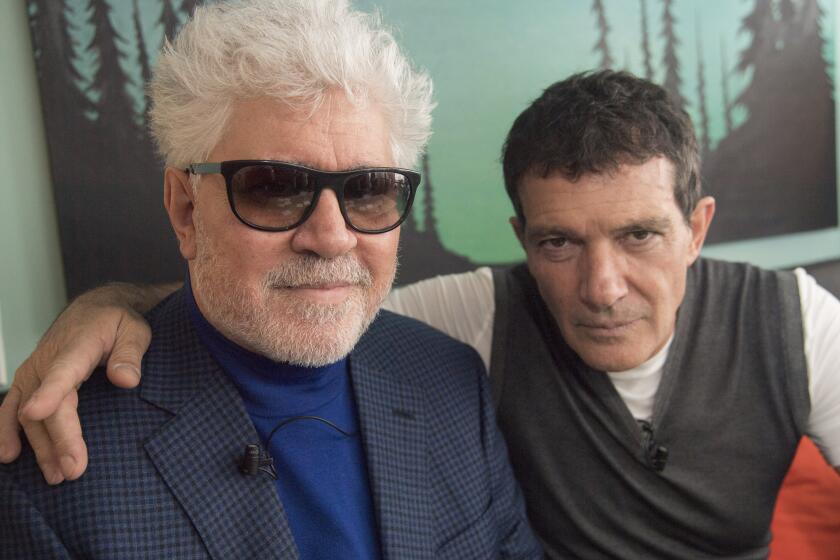A life-altering event gave Antonio Banderas the right outlook for ‘Pain and Glory’

- Share via
Before Pedro Almodóvar sent the “Pain and Glory” screenplay to his old friend Antonio Banderas, the Spanish auteur warned the actor that certain aspects of the story — about a groundbreaking gay filmmaker suffering from many ailments including a bad case of writer’s block — might seem strangely familiar.
“What I didn’t know was how far he wanted to take the main character, Salvador Mallo, close to him,” Banderas said recently, speaking by phone from his hometown of Málaga, Spain. “So when I read the script, there were so many things that I said, ‘Oh, my God, this is Pedro.’ ”
“Pain and Glory,” “The Report” are among the Oscar contenders to visit The Envelope Live screening series.
Mallo, of course, isn’t Almodóvar, but throughout the moving, character-driven story, it can sometimes be difficult to discern where Salvador ends and the real director begins. An acclaimed filmmaker, Mallo lives in a beautifully appointed apartment in Madrid, where he contends with an array of maladies from tinnitus, back pain and headaches to panic, anxiety and depression. An invitation to attend a retrospective screening of his masterpiece, “Flavor,” spurs Mallo to reconnect with the film’s star, Alberto, with whom he hadn’t spoken in 30 years, and slowly, he begins to make peace with the past and find a path toward a more optimistic future. But it isn’t easy.
As Mallo, Banderas delivers a tender, nuanced performance, one that earned him lead actor honors at the 2019 Cannes Film Festival, as well as his first Oscar nomination. “It feels very good after being a professional for 40 years,” Banderas said of the acclaim.
Seven seasoned film journalists predict the winners in 10 Oscar categories. Vote for your picks!
It was Almodóvar who gave him his first role. Banderas made his screen debut in the filmmaker’s 1982 release “Labyrinth of Passion,” and they continued to work together during the 1980s on colorful, provocative projects including 1987’s “Law of Desire,” which saw Banderas in a groundbreaking turn as a gay man whose relationship with an adult-film director quickly descends into obsession. Following 1988’s Oscar-nominated “Women on the Verge of a Nervous Breakdown,” Banderas departed to Hollywood and quickly found a place on the A-list, working steadily in high-profile, largely commercial studio fare.
Still, he always remained connected to Almodóvar and his transgressive art house roots. “When I went to America and I left behind Pedro in the ’80s, I remember calling him or some of our common friends,” Banderas said. “They were saying basically that [Pedro] was very isolated, that he was suffering from back pain, from migraines, from a number of diseases that are described in [‘Pain and Glory’] and all of them are actually true. The thing that I find very interesting is that he managed to actually get out of that state through art, through cinema.”
When “Pain and Glory” opens, Salvador is very much mired in his miseries, both physical disorders and old emotional wounds that have festered and left him largely isolated and alone. Playing someone who has become so inwardly focused, Banderas spent time developing the inner life of the character.
“I started this particular project from zero with a lot of economy in my acting,” Banderas said. “Pedro, really, really early in the process, informed me that he was going to use a lot of close-ups. He wanted to photograph the soul of the character, and in order to do that, he wanted to go very close to my face and my eyes.”
His approach to the role was also influenced by his own brush with death in 2017, when the actor, then just 56, suffered a heart attack during a routine workout. The experience left him changed, he says, and brought a sense of ease and purpose to his acting.
“Almodóvar detected that from the beginning of the rehearsal — he said, ‘I don’t know what happened to you psychologically after you had the heart attack, but there is something that is very interesting that I haven’t seen in you before, and I don’t want you to hide it. I want you to use it, this tranquillity.’ ”
In terms of Salvador’s outward appearance, however, that was all Almodóvar — as was the character’s stylish home, which was an exact replica of the writer-director’s chic European apartment. “The way that he dressed me up, that’s the way that Pedro Almodóvar dresses,” Banderas said. “In fact, I used many of his garments. There were a number of things that he provided me with that were really him.
“Then, he said to me one day, ‘If you want to use some of my mannerisms, you can.’ But I said to him, ‘No.’ I thought that could be dangerous and very destructive if I started using the way he moves his hands and the way he talks. It was going to be an imitation. I didn’t want to do an imitation. I just wanted to create the character from the inside out.”
Although he did not initially create the role of Salvador expressly for Banderas, Almodóvar said it soon became evident that he was the best actor for the part. “Even before finishing the script, Antonio seemed the most legitimate choice for the role,” Almodóvar said. “Because of his age, his experience with illness, his closeness with me — also because he knew firsthand part of the material. He had witnessed some of the scenes. I was thinking of Fellini and his relationship with Marcello Mastroianni, his alter ego. And my most legitimate Mastroianni was Antonio, without a question.”
The intimacy between them seeped into every frame of the film but is perhaps most evident in the fraught interactions between Salvador and Alberto (Asier Etxeandia), who introduces Mallo to recreational heroin as they spar and laugh together. “For the movie, he put together a Frankenstein through the character of Alberto, this actor, and many of us are included in that character,” Banderas said.
It’s there too in a poignant flashback in which Mallo apologizes to his elderly mother (Julieta Serrano), whom he fears he has disappointed by living as an out gay man with a career in the arts. “Pedro, normally he goes to the set with the actors and he reads scenes with them just before we start shooting,” Banderas said. “He couldn’t read [that scene]. I saw firsthand how deep and complex that emotion was for him. So I said to him, ‘All you have to do now is say, “action,” because I feel it in me, what you’re feeling.’
“The issues that we are treating in the movie — reconciliation, forgiveness, closing wounds — everybody travels in life with those miseries, with that pain, everybody,” Banderas added. “It doesn’t matter that we are talking about Pedro Almodóvar. All around the world, in France, in Italy, in Germany, in Spain, people identify with that kind of thinking because they can see themselves in there.”
With the buzz around “Pain and Glory” continuing to grow as the Academy Awards ceremony approaches, Banderas is turning his attention to what comes next. The actor recently opened a theater in Málaga that he bought three years ago, and he says he wants to take a more relaxed approach to choosing future roles.
“I’m very happy doing something that I always wanted to do in my hometown very successfully,” Banderas said. “I will do the movies that I actually want to do. That’s really something different now that’s happening in my life, and I’m trying to use it in a nice way.”
More to Read
Only good movies
Get the Indie Focus newsletter, Mark Olsen's weekly guide to the world of cinema.
You may occasionally receive promotional content from the Los Angeles Times.












